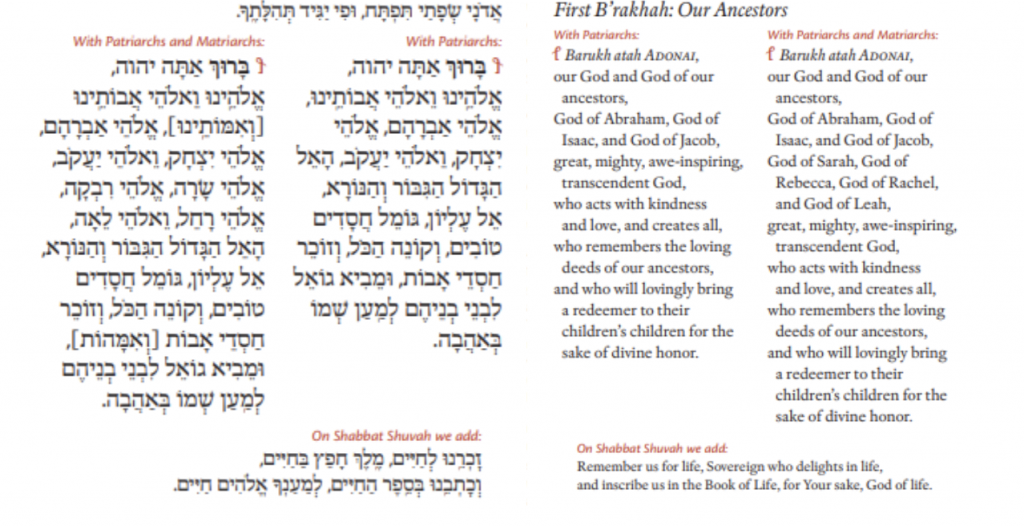Episode 13: Who is Present? (Avot V'Imahot)
Listen Now
Who is Present?
Now that we’ve taken three steps back and three steps forward, and delved into the first three words of each bracha, it’s time to explore the first blessing of the Amidah- Avot V’Imahot, patriarchs, and as we discuss, also matriarchs. There is so much to uncover in just this one paragraph, including: Our feelings about adding to prayer, Poetic language that goes up to the heavens and back down to earth, inter-text galore, many musical modes, and Jedi ghosts. Really.
Join our new Facebook group to discuss all things T’fillah and T’fillah education here!
(3:01) Learn more about Jews and Ellis Island here.
(4:35) Learn more about the Jewish history of the Lower East Side here.
(4:38) A knish is a traditional Ashkenazi Jewish food, dough filled with potato or other fillings.
(5:37) You can find our previous episodes, including the ones on the Amidah, here.
(6:08) A responsa about adding Imahot to the Amidah from 1990
(6:46) The following is from the Lev Shalem Shabbat and Festival Siddur, here.
(8:17) Kavod – כבוד – honor.
(9:38) Click to learn more about the Havurah Movement, Reform Movement, Renewal Movement, and Reconstructing Judaism.
(10:33) Correction: This verse is from Exodus 6:3.
(13:29) Learn more about Bilhah and Zilpah here.
(15:16) Hevruta – חברותא – study partner. You can find Dirshuni: A Contemporary Women’s Midrash here.
(15:51) End of Return of the Jedi
(16:19) Zchut avot – זכות אבות – the merit of our ancestors.
(16:54) Learn more about Chava Mirel here.
(20:17) Nusach – נוסח- musical style or tradition of a community.
(20:45) Eloheicha – אלהיך – Your G?d.
(22:49) You can listen to Eliana’s Song “Elohecha” here.
(25:07) Learn more about Limud at Ramah Darom here.
(25:20) Midrash – מדרש – interpretation.
(26:07) Tanach – תנ”ך – the complete Bible, including Torah, Prophets, and Writings. Learn more here.
(26:14) Learn more about Rabbi Elie Kaunfer here.
(26:29) Deuteronomy 10:16-19
וּמַלְתֶּ֕ם אֵ֖ת עׇרְלַ֣ת לְבַבְכֶ֑ם וְעׇ֨רְפְּכֶ֔ם לֹ֥א תַקְשׁ֖וּ עֽוֹד׃
U’melachtem et orlat levavchem ve’arpchem lo takshu od.
Cut away, therefore, the thickening about your hearts and stiffen your necks no more.
כִּ֚י יְהֹוָ֣ה אֱלֹֽהֵיכֶ֔ם ה֚וּא אֱלֹהֵ֣י הָֽאֱלֹהִ֔ים וַאֲדֹנֵ֖י הָאֲדֹנִ֑ים הָאֵ֨ל הַגָּדֹ֤ל הַגִּבֹּר֙ וְהַנּוֹרָ֔א אֲשֶׁר֙ לֹא־יִשָּׂ֣א פָנִ֔ים וְלֹ֥א יִקַּ֖ח שֹֽׁחַד׃
Ki adonai eloheichem hoo elohei haelohim vadonei haadonim hael hagadol hagibur vehanorah asher lo yisa fanim velo yukach shochad.
For the Lord your G?d is G?d supreme and Lord supreme,-d the great, the mighty, and the awesome God, who shows no favor and takes no bribe,
עֹשֶׂ֛ה מִשְׁפַּ֥ט יָת֖וֹם וְאַלְמָנָ֑ה וְאֹהֵ֣ב גֵּ֔ר לָ֥תֶת ל֖וֹ לֶ֥חֶם וְשִׂמְלָֽה׃
Oseh mishpat yatom vealmana veohev ger latet lo lechem vesimlah.
But upholds the cause of the fatherless and the widow, and befriends the stranger, providing him with food and clothing.—
וַאֲהַבְתֶּ֖ם אֶת־הַגֵּ֑ר כִּֽי־גֵרִ֥ים הֱיִיתֶ֖ם בְּאֶ֥רֶץ מִצְרָֽיִם׃
Veahavtem et hager ki gerim hayitem be’eretz mitzryaim.
You too must befriend the stranger, for you were strangers in the land of Egypt.
(Translation from Sefaria)
(28:22) Chesed – חסד – lovingkindness.
(29:38) Mitzvah – מצווה – commandment.
(29:41) Ve’ahavta et hager – ואהבת את הגר – and you should love the stranger.
(30:13) Here is the full quote from Rabbi Shai Held:
“I have largely lost interest in whether people tell me they believe in G!D. First of all I want to know what G!D they believe in. Second of all I want to know if that G!D asks you to live lives of hate or lives of love. I want to know if that G!D pushes them to love people they otherwise might not… what does the G!D you profess to believe in ask of you? What does it mean about how you speak to your child when you’re feeling frustrated and hurt? What does it mean about how you speak to people over whom you have power? Are the people who work for you afraid of you? …. How does theology translate into action? Ideally it translates into every action I take. If I believe in a G!D who affirms tzelem elohim, who affirms the claim that human beings are created in the image of god, everything I do, everything I am in the world is shaped by that claim.”
(30:47) You can find the Talmud teaching Eliana discusses here.
(34:31) Learn more about Rabbi Marcia Prager’s work here.
(34:38) Learn more about Rabbi Jill Hammer’s work here.
(35:02) You can find Mishkan T’fllah here.
(35:13) You can find Siddur Sim Shalom here.
(37:11) Liknot – לקנות – to buy or to acquire.
(37:39) Josh is referencing Pirkei Avot 1:7
יְהוֹשֻׁעַ בֶּן פְּרַחְיָה וְנִתַּאי הָאַרְבֵּלִי קִבְּלוּ מֵהֶם. יְהוֹשֻׁעַ בֶּן פְּרַחְיָה אוֹמֵר, עֲשֵׂה לְךָ רַב, וּקְנֵה לְךָ חָבֵר, וֶהֱוֵי דָן אֶת כָּל הָאָדָם לְכַף זְכוּת:
Joshua ben Perahiah and Nittai the Arbelite received [the oral tradition] from them. Joshua ben Perahiah used to say: appoint for yourself a teacher, and acquire for yourself a companion and judge all men with the scale weighted in his favor.
(Translation based on Sefaria)
(38:33) You can find My People’s Prayer Book Vol 2: The Amidah here.
(39:18) Goel – גואל – Redeemer. Geula – גאולה – Redemption.
(41:25) There is No Messiah and You’re It by Rabbi Robert N. Levine can be found here.
(41:39) Learn more about the idea of inviting Eliyahu Hanavi to baby naming and bris ceremonies here.
(42:45) Chatima – חתימה – the thematic summation in blessing form.
(43:37)
Melech ozer [u’foked] u’moshiah umagein. Baruch atah adonai magein avraham [ufokeid/b’ezrat sarah].
(45:09) Genesis 15:1
אַחַ֣ר ׀ הַדְּבָרִ֣ים הָאֵ֗לֶּה הָיָ֤ה דְבַר־יְהֹוָה֙ אֶל־אַבְרָ֔ם בַּֽמַּחֲזֶ֖ה לֵאמֹ֑ר אַל־תִּירָ֣א אַבְרָ֗ם אָנֹכִי֙ מָגֵ֣ן לָ֔ךְ שְׂכָרְךָ֖ הַרְבֵּ֥ה מְאֹֽד׃
Some time later, the word of the LORD came to Abram in a vision. He said, “Fear not, Abram, I am a shield to you; Your reward shall be very great.”
(Translation from Sefaria)
(45:27) Genesis 21:1
וַֽיהֹוָ֛ה פָּקַ֥ד אֶת־שָׂרָ֖ה כַּאֲשֶׁ֣ר אָמָ֑ר וַיַּ֧עַשׂ יְהֹוָ֛ה לְשָׂרָ֖ה כַּאֲשֶׁ֥ר דִּבֵּֽר׃
Vadonai pakad et sarah ca’asher amar vaya’aas adonai lesarah ca’asher deeber.
The Lord took note of Sarah as He had promised, and the Lord did for Sarah as He had spoken.
(Translation from Sefaria)
(46:55) Learn more about Adon Olam here.
(50:38) Davening – Yiddish for praying.




